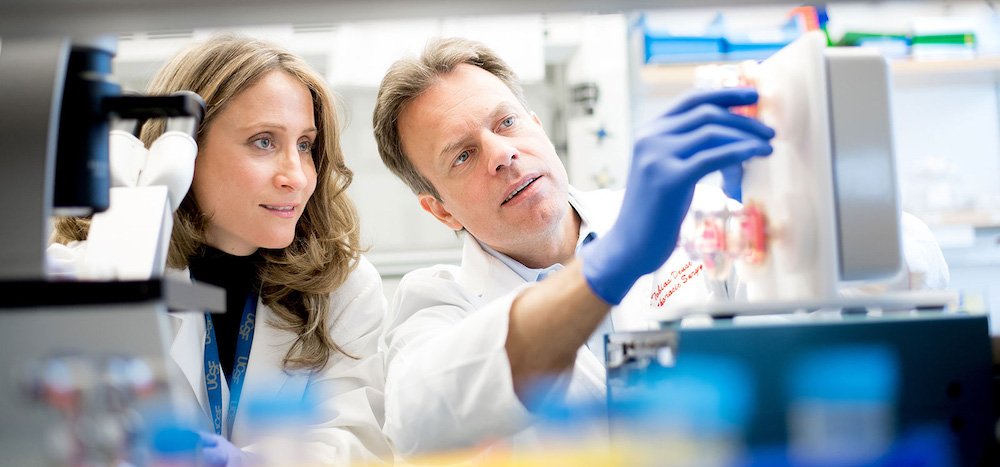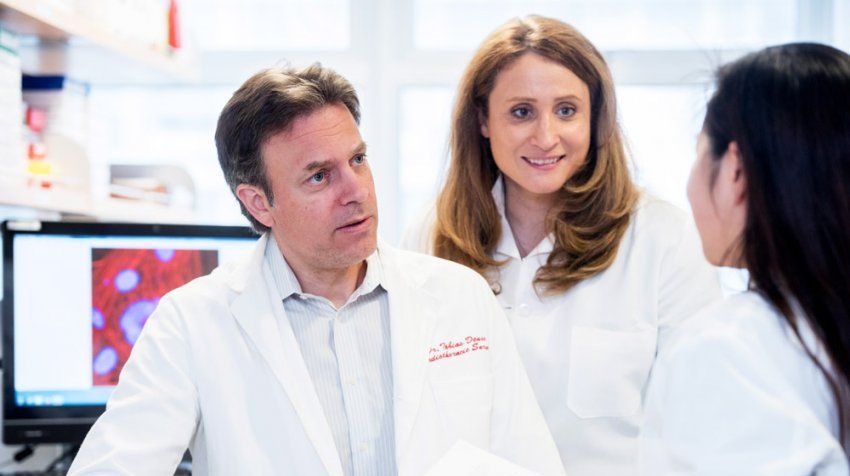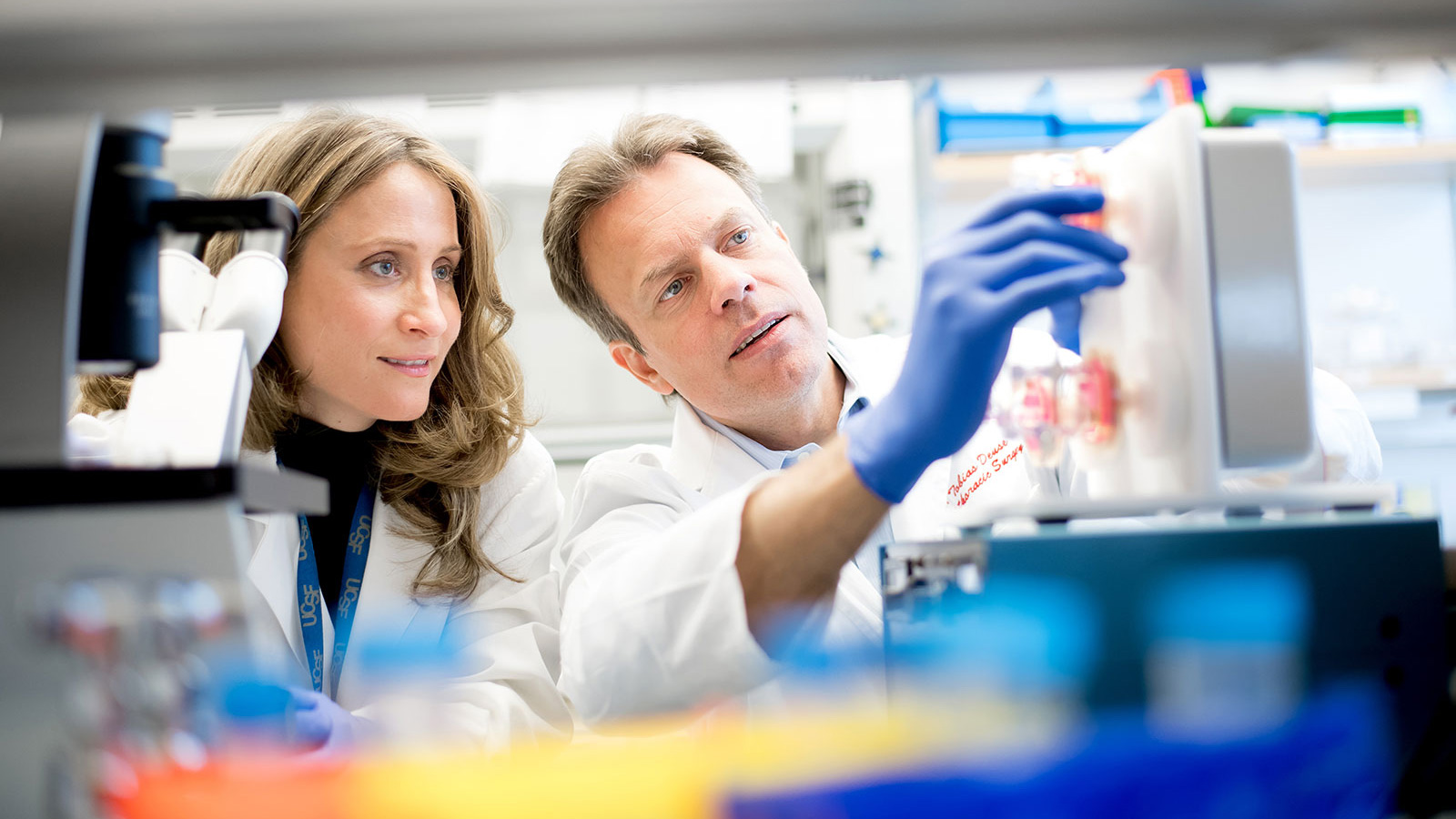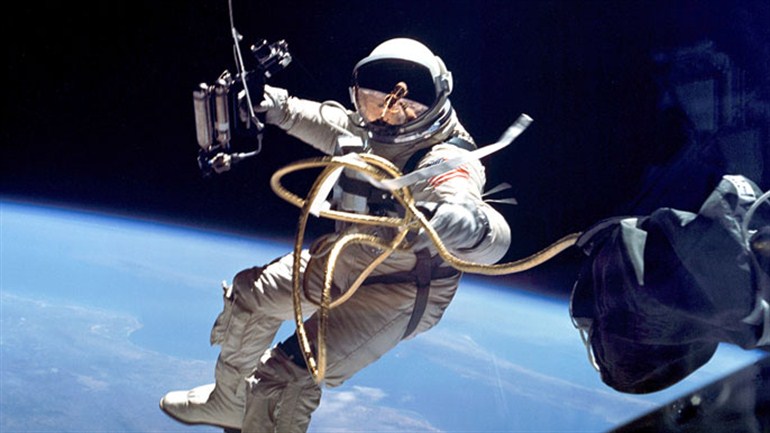Patient
Clinical Services
- Advanced Heart failure Program
- Cardiac Surgery Program
- Center of Aortic disease
- Heart Transplant Program
- Lung Transplant Program
- Mechanical Circulatory Support Program
- Thoracic Surgery & Oncology Program
- Robotic Surgery Program
Patient Education
- Arrhythmias
- Atherosclerosis
- Atrial Fibrillation
- Barrett's Esophagus
- Coronary Artery Bypass Grafting (CABG)
- Coronary Artery Disease
- Endocarditis
- Endoscopic Thoracic Sympathectomy
- Esophageal Cancer
- Esophagectomy
- Extracorporeal Membrane Oxygenation (ECMO)
- Extrapleural Pneumonectomy
- Heart Failure
- Heart Transplant
- Heart Valve Disease
- Hyperhidrosis
- Lung Cancer Screening
- Lung Metastases
- Lung Transplant
- Marfan Syndrome
- Mediastinoscopy
- Minimally Invasive Aortic Valve Surgery
- Minimally Invasive Atrial Septal Defect (ASD) Closure
- Minimally Invasive Cardiac Surgery Techniques
- Minimally Invasive Mitral Valve Surgery
- Mitral Valve Prolapse
- Non-Small Cell Lung Cancer
- Pericarditis
- Open Mitral Valve Surgery
- Robotic Thoracic Surgery
- Small Cell Lung Cancer
- Supravalvular Aortic Stenosis
- Ventricular Assist Devices (VAD)
- Ventricular Septal Defect
Patient Resources
- Returning Home From the Hospital
- Cancer Support Services
- International Patient Services
- Osher Center Integrative Medicine
- Clinical Trials
Education
Research
Team
About
News
Intranet

Sonja Schrepfer, M.D., Ph.D.
- Professor of Surgery
- Division of Adult Cardiothoracic Surgery
- Director, Transplant and Stem Cell Immunobiology (TSI) Lab
Contact Information
Education
University of Wuerzburg and Munich, Germany MD 10/2001 Medicine, Immunology
University of Wuerzburg, Germany Doctoral Thesis 05/2002 Medicine, Immunology
University of Hamburg, Germany and Stanford University, Stanford, CA PhD 01/2007 Experimental Cardiac Surgery, Transplant Immunobiology
Stanford University, Stanford, CA Postdoctoral Training and Instructor 02/2009 Cardiothoracic Surgery, Transplant Immunobiology
Research Interests
- Cardiovascular MechanismsiInvolved in Vessel Stenosis
- Pluripotent Stem Cell Immunobiology
- Transplant Immunology
- Vascular Biology of Mice During Space Travel
Website Links
- Transplant and Stem Cell Immunobiology (TSI) Lab (University of California, San Francisco)
- Transplant and Stem Cell Immunobiology (TSI) Lab (UKE Hamburg)
Foreign Languages Spoken
- German, French
Biography
Sonja Schrepfer, M.D., Ph.D., Professor of Surgery, founded the Transplant and Stem Cell Immunobiology (TSI) Lab in 2009 in Germany. In 2016, she joined the faculty of the Department of Surgery at the University of California San Francisco. She is also Director of the TSI Lab at UCSF.
Dr. Schrepfer's research career has been dedicated to making fundamental discovers in stem cell immunology, transplant and cardiovascular immunobiology. Her lab currently works on immunobiological mechanisms of pluripotent stem cells (mouse and human). One project uses e.g. a combination of molecular/cellular biology, genomic/epigenomic profiling, tissue engineering, and molecular imaging technologies to better understand stem cell biology in vitro and in vivo. She has made significant contributions in the field of immunological barriers in regenerative medicine and in identifying novel immunobiological targets involved in cardiovascular diseases.
The TSI Lab is also investigating the vascular biology of "mice from space"; that is mice that have spent time at the international space station (ISS). This research will provide insight into what physiological effects time in outer space might have on astronauts, with potentially important implications for future longer-term missions, and has the possibility to open the door to fascinating new discoveries that could be used in earth-bound cardiovascular research.
Research Overview
Dr. Schrepfer's research aims to understand the critical immunological barrier that presently precludes the successful application of cell-based regenerative therapy Her TSI Lab has made seminal contributions to the field, including the first description of the antigenicity of mitochondria in embryonic stem cells derived by somatic cell nucleus transfer (SCNT). Currently, her group is interested in understanding the molecular, cellular, and epigenetic landscape changes after transplantation of stem cells and their derivates and we are aiming to decrease the immunogenic potential of PSCs.
The lab has also discovered novel pathways involved in the development of vascular intimal hyperplasia. Myointimal hyperplasia is a pathological process of the vascular system characterized by abnormal proliferation of smooth muscle cells of the vascular wall that leads to luminal obliteration and subsequent ischemia. Myointimal hyperplasia may occur in patients after vessel injury during medical procedures (e.g. after balloon dilation or stent placement) or after pathological injury of the blood vessel (e.g. due to inflammation or toxic exposure). It can cause graft failure and in-stent restenosis. To help prevent this and increase the success of treatments for coronary heart disease, Dr. Schrepfer's lab has also developed novel humanized models to study the development of intimal hyperplasia.
Transplant immunology after heart and lung transplantation is another area the lab is exploring with particular focus on translational research and investigation of underlying mechanisms of acute and chronic graft rejection. Novel drug discoveries will benefit our patients tremendously.
Research & Funding
Data provided by UCSF Profiles, powered by CTSI
- Hypo-immunogenic cardiomyocytes for myocardial repairSponsor: NIH/NHLBISponsor ID: R01HL140236Funding Period:Aug 2018-Jun 2022Co-Principal Investigator
- Microgravity as model for immunological senescence and its impact on tissue stem cells and regenerationSponsor: NIH/NCATSSponsor ID: UH3TR002192Funding Period:Jun 2017-Jun 2021Principal Investigator
Publications
MOST RECENT PUBLICATIONS FROM A TOTAL OF 98
Data provided by UCSF Profiles, powered by CTSI
- Gravina A, Tediashvili G, Zheng Y, Iwabuchi KA, Peyrot SM, Roodsari SZ, Gargiulo L, Kaneko S, Osawa M, Schrepfer S, Deuse T. Synthetic immune checkpoint engagers protect HLA-deficient iPSCs and derivatives from innate immune cell cytotoxicity. Cell Stem Cell. 2023 Nov 02; 30(11):1538-1548.e4. View in PubMed
- Hu X, White K, Olroyd AG, DeJesus R, Dominguez AA, Dowdle WE, Friera AM, Young C, Wells F, Chu EY, Ito CE, Krishnapura H, Jain S, Ankala R, McGill TJ, Lin A, Egenberger K, Gagnon A, Michael Rukstalis J, Hogrebe NJ, Gattis C, Basco R, Millman JR, Kievit P, Davis MM, Lanier LL, Connolly AJ, Deuse T, Schrepfer S. Hypoimmune induced pluripotent stem cells survive long term in fully immunocompetent, allogeneic rhesus macaques. Nat Biotechnol. 2023 May 08. View in PubMed
- Hu X, Gattis C, Olroyd AG, Friera AM, White K, Young C, Basco R, Lamba M, Wells F, Ankala R, Dowdle WE, Lin A, Egenberger K, Rukstalis JM, Millman JR, Connolly AJ, Deuse T, Schrepfer S. Human hypoimmune primary pancreatic islets avoid rejection and autoimmunity and alleviate diabetes in allogeneic humanized mice. Sci Transl Med. 2023 04 12; 15(691):eadg5794. View in PubMed
- Hu X, Manner K, DeJesus R, White K, Gattis C, Ngo P, Bandoro C, Tham E, Chu EY, Young C, Wells F, Basco R, Friera A, Kangeyan D, Beauchesne P, Dowdle WE, Deuse T, Fry TJ, Foster AE, Schrepfer S. Hypoimmune anti-CD19 chimeric antigen receptor T cells provide lasting tumor control in fully immunocompetent allogeneic humanized mice. Nat Commun. 2023 04 10; 14(1):2020. View in PubMed
- Gravina A, Tediashvili G, Rajalingam R, Quandt Z, Deisenroth C, Schrepfer S, Deuse T. Protection of cell therapeutics from antibody-mediated killing by CD64 overexpression. Nat Biotechnol. 2023 05; 41(5):717-727. View in PubMed
- View All Publications
In the News
- UCSF Division of Adult Cardiothoracic Surgery - Iamina Racine - March 07, 2022Tobias Deuse, M.D. and Sonja Schrepfer, M.D., Ph.D., were awarded the UH3 Supplement Grant worth $260,009 to continue their work on how spaceflight changes the immune system and stem cell niche. To better understand the relevance of the astronauts' experience to human health — both on the ground and beyond — NIH's National Center for Advancing Translational Sciences (NCATS) partnered with the International Space Station U.S. National Laboratory (ISS National Lab) to send tissue chips, a [...]

- UCSF News - Jason Alvarez - August 20, 2019Mutations in Mitochondrial DNA Induced by Cell Reprogramming May Trigger Immune Response In 2006, scientists discovered a way to "reprogram" mature cells – adult skin cells, for example – into stem cells that could, in principle, give rise to any tissue or organ in the body. Many assumed it was only a matter of time until this groundbreaking technique found its way into the clinic and ushered in a regenerative medicine revolution. Because the same patient would be both the donor and the [...]

- Transplant and Stem Cell Immunobiology (TSI) Lab - Jason Alvarez (UCSF News Services)
- February 26, 2019Technique Prevents Transplant Rejection in the Lab, a Major Advance for Stem Cell Therapies Human heart muscle cells derived from triple-engineered stem cells that are "invisible" to the immune system. The red is troponin, a protein that participates in cardiac muscle contraction. The blue is the cell's nucleus. Researchers hope cells like these will eventually be used to treat heart failure. Credit: Xiaomeng Hu. UC San Francisco scientists have used the CRISPR-Cas9 gene-editing system [...]
- Transplant and Stem Cell Immunobiology (TSI) Lab - Richard Barg - December 05, 2018Sonja Schrepfer, M.D., Ph.D. and Tobias Deuse, M.D. have been awarded a 4-Year $3M NIH R01 Grant to study the role of cardiomyocytes in heart repair. Dr. Schrepfer is an associate professor and director of the UCSF Transplant and Stem Cell Immunobiology (TSI) Lab. Dr. Deuse, a renowned heart surgeon, is associate professor and director of minimally-invasive cardiac surgery at UCSF and a principal investigator in the TSI lab. The study will generate hypo-immunogenic cardiomyocytes that [...]

- Transplant and Stem Cell Immunobiology (TSI) Lab - Richard Barg - February 26, 2018Sonja Schrepfer, M.D., Ph.D. and Tobias Deuse, M.D. have been awarded a 4-year $2.4M NIH grant by the National Center for Advancing Translational Sciences (NCATS) to investigate space-related physiological changes, analogous to those observed during aging, including defects in bone healing, loss of cardiovascular and neurological capacity, and altered immune function. Dr. Schrepfer is associate professor and director of the UCSF Transplant and Stem Cell Immunobiology (TSI) Lab. Dr. Deuse is [...]

- UCSF Vascular & Endovascular Surgery - Richard Barg - August 14, 2017UCSF News reports on research into the effects of space travel, known and unknown, to the physiology and bodies of astronauts traveling about the international space station (ISS). The research has profound implications for longer trips to distant planets, notably NASA's goal of flying a manned spacecraft to Mars. Research into the novel and myriad effects of space travel on humans will be critical to the success of this endeavor. Three faculty in the UCSF Department of Surgery and an [...]

- UCSF Adult CT, Transplant and Stem Cell Biology (TSI) Lab - Richard Barg - June 16, 2017Sonja Schrepfer, M.D., Ph.D., Associate Professor and Director of the UCSF Transplant and Stem Cell Immunobiology (TSI) Lab, was recently awarded a grant by the California Institute for Regenerative Medicine (CIRM) to engineer a "Hypo-Immunogenic Cardiac Patches for Myocardial Regeneration". The funding is part of CIRM's Discovery: Inception program is for seed funding for great ideas that have the potential to impact human stem cell research, funding that will enable the researchers to test [...]

- Department of Surgery - Richard Barg - November 18, 2016The Transplant and Stem Cell Immunobiology (TSI) Lab at UCSF has officially launched its new website. Its two principal investigators, Sonja Schrepfer, M.D., Ph.D., Lab Director and Associate Professor of Surgery, and Tobias Deuse, M.D., Associate Professor of Surgery and Director of Minimally Invasive Cardiac Surgery, both of the Division of Adult Cardiothoracic Surgery, conduct research to answer complex questions about stem cell therapy, heart and lung transplantation, and cardiovascular [...]

